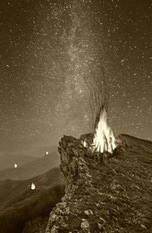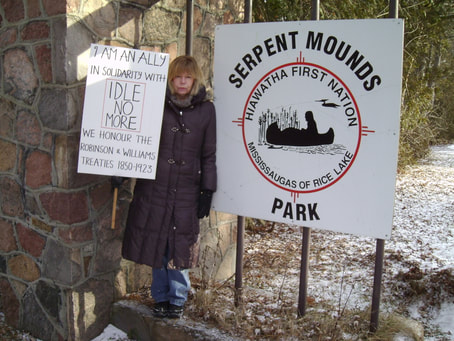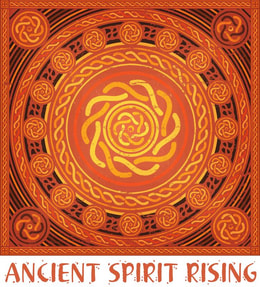PEGI EYERS
Partnering with the original Earthkeepers of Turtle Island in our shared love of the land, for common causes and issues of environmental protection, will do much to heal the First Nation/Settler divide. Yet peaceful cohabitation on Turtle Island will not occur automatically, until our process of “unsettling the settler” has acknowledged the original treaties that set out terms for our peaceful co-existence. As agreements set up between sovereign nations, treaties guide the rights, actions and obligations of both First Nations and Settlers, and the phrase “We Are All Treaty People” is not just a metaphor. On lands that are governed by treaties, our white identity needs to be reframed by our responsibility to First Nations and to the land itself. We also need to acknowledge that the basic premise of the treaties was flawed, as the Settler understanding of the treaty process was based on money and land acquisition, whereas the understanding of First Nations was based on a shared responsibility to the land, and the other-than-human world.
Intrinsic rights to land-imbedded culture were negotiated in the original treaties, to empower all people to live peacefully on the land, and the directives for mutual First Nations/Settler co-existence are still in place today. Against all odds, First Nations continue to remind us of our shared responsibility as treaty people, and continue to welcome us into a future that could manifest the original visions of mutuality and respectful relationship their Ancestors held. What better model to follow than the treaties, as the paradigm shifts to localized peak-oil communities, and we challenge the imperialist worldview, both for First Nations and ourselves? Placing our trust in First Nations community instead of Empire, and giving them our support to restore the treaties in our shared territories, would seem the most logical thing to do.
With honesty, humility and respect, we can share the ethics of the journey right now, as we move back and forth between the processes of allyship, activism, reconciliation and finally, retribution. It is also our responsibility to educate the overculture on these issues, for “as long as Canadians see a wilderness extending beyond their cities and towns, they do not belong to the land and will continue to view aboriginal peoples ambivalently, with envy and sometimes disgust. Before Canadians can feel comfortable with themselves and their territory, and cast away their obsessions with identity and goodness, Canada needs a rite of passage, a cathartic experience, through which non-aboriginal Canadians earn aboriginal peoples’ respect. I am not referring to ‘truth and reconciliation’ – reconciliation is more than a confession or apology, it must include some form of restitution. Beneficiaries of injustice must be willing to share their wealth and privileges with the victims; they must believe that by sharing, they too gain something - trust and a shared country.”
(Russel Lawrence Barsh)
Russel Lawrence Barsh, “Aboriginal Peoples and Canada’s Conscience,” Hidden in Plain Sight: Contributions of Aboriginal Peoples to Canadian Identity and Culture, edited by David R. Newhouse, Cora J. Voyageur and Dan Beavon, University of Toronto Press, 2005.
Truth and Reconciliation Commission of Canada ~ 94 Calls to Action
The Truth and Reconciliation Commission of Canada lists events, projects, resources and other ways to get involved. “The truth of our common experiences will help set our spirits free and pave the way to reconciliation.” www.trc.ca
Partnering with the original Earthkeepers of Turtle Island in our shared love of the land, for common causes and issues of environmental protection, will do much to heal the First Nation/Settler divide. Yet peaceful cohabitation on Turtle Island will not occur automatically, until our process of “unsettling the settler” has acknowledged the original treaties that set out terms for our peaceful co-existence. As agreements set up between sovereign nations, treaties guide the rights, actions and obligations of both First Nations and Settlers, and the phrase “We Are All Treaty People” is not just a metaphor. On lands that are governed by treaties, our white identity needs to be reframed by our responsibility to First Nations and to the land itself. We also need to acknowledge that the basic premise of the treaties was flawed, as the Settler understanding of the treaty process was based on money and land acquisition, whereas the understanding of First Nations was based on a shared responsibility to the land, and the other-than-human world.
Intrinsic rights to land-imbedded culture were negotiated in the original treaties, to empower all people to live peacefully on the land, and the directives for mutual First Nations/Settler co-existence are still in place today. Against all odds, First Nations continue to remind us of our shared responsibility as treaty people, and continue to welcome us into a future that could manifest the original visions of mutuality and respectful relationship their Ancestors held. What better model to follow than the treaties, as the paradigm shifts to localized peak-oil communities, and we challenge the imperialist worldview, both for First Nations and ourselves? Placing our trust in First Nations community instead of Empire, and giving them our support to restore the treaties in our shared territories, would seem the most logical thing to do.
With honesty, humility and respect, we can share the ethics of the journey right now, as we move back and forth between the processes of allyship, activism, reconciliation and finally, retribution. It is also our responsibility to educate the overculture on these issues, for “as long as Canadians see a wilderness extending beyond their cities and towns, they do not belong to the land and will continue to view aboriginal peoples ambivalently, with envy and sometimes disgust. Before Canadians can feel comfortable with themselves and their territory, and cast away their obsessions with identity and goodness, Canada needs a rite of passage, a cathartic experience, through which non-aboriginal Canadians earn aboriginal peoples’ respect. I am not referring to ‘truth and reconciliation’ – reconciliation is more than a confession or apology, it must include some form of restitution. Beneficiaries of injustice must be willing to share their wealth and privileges with the victims; they must believe that by sharing, they too gain something - trust and a shared country.”
(Russel Lawrence Barsh)
Russel Lawrence Barsh, “Aboriginal Peoples and Canada’s Conscience,” Hidden in Plain Sight: Contributions of Aboriginal Peoples to Canadian Identity and Culture, edited by David R. Newhouse, Cora J. Voyageur and Dan Beavon, University of Toronto Press, 2005.
Truth and Reconciliation Commission of Canada ~ 94 Calls to Action
The Truth and Reconciliation Commission of Canada lists events, projects, resources and other ways to get involved. “The truth of our common experiences will help set our spirits free and pave the way to reconciliation.” www.trc.ca
 "Peaceful Co-existence" Chapter 29 excerpt ~ Ancient Spirit Rising: Reclaiming Your Roots & Restoring Earth Community by Pegi Eyers PURCHASE LINKS Amazon.com www.stonecirclepress.com |


